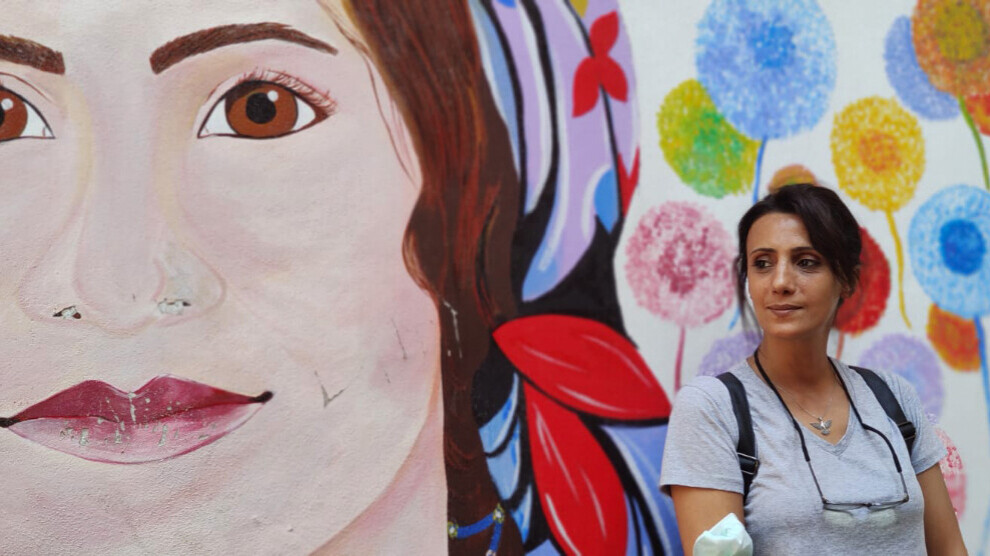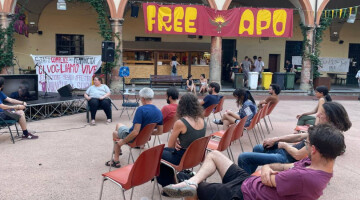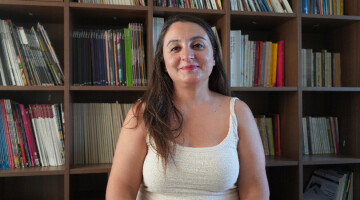Kurdish author Meral Şimşek is one of those affected by the systematic criminalization of freedom of expression and thought by the regime in Turkey. Based on her books and stories, she has been on trial in Malatya since the beginning of the year. Şimşek is a PEN member and stresses before the next court hearing on September 21 that she will not be silenced.
Meral Şimşek is from Amed (Diyarbakır) and her family is patriotic. She got to know the cruel and sinister face of the state at an early age. Her sister and brother were killed in the liberation struggle. When she was 13 years old, she was arrested and tortured for the first time: electric shocks, bastinado, rape with a club.... She carried the traces of this torture with her for years. Based on her own story, she wrote books with which she has made the suffering of the Kurdish people known to the world. For this she was awarded nine times in Germany, Iraq and England. As no success goes unpunished in Turkey, she is charged with PKK membership and terror propaganda.
The trial is a vendetta
Meral Şimşek spoke to ANF about her difficult experiences. She sees the trial against her primarily as a vendetta. As she herself recounts, she was abducted by car in Malatya in April 2019. Her abductors introduced themselves as police officers and put pressure on her to become an informer. Because she made this incident public, she was put on the hit list. Human rights lawyer Eren Keskin brought the case to the UN and denounced the Malatya police.
"The people who kidnapped me and showed me their police ID cards threatened me that they would finish me off if I exposed them and did not accept their offer. A year and a half after we brought a suit, charges were not filed against my kidnappers, but against me. On December 9, 2020, police officers entered my apartment in the middle of the night and arrested me. My awards, my electronic equipment, everything was confiscated. I was taken to the anti-terror department of the Malatya police and searched naked. At that time, I had just undergone surgery. Due to the torture in the 1990s, my uterus had to be removed, I also lost a piece of intestine. When I was 13 years old, I was tortured and abused with a club in police custody in Mazıdağı, Mardin. The torture was to make my elder brother and elder sister talk. Although I told the police in Malatya that I had just had surgery, a vaginal check was made."
"The name of my protagonist Arzela supposed to be my code name"
After several days, Meral Şimşek was released on reporting charges. Only a month later, charges were filed in Maltaya. In the indictment, everything is considered a crime: Her books, her awards, her short stories, literary events she participated in. "Even my story Arzela, which won two prizes in England and from British PEN, is considered evidence of my supposed membership and organizational propaganda. It was actually about a competition to which I had been invited. People were specifically invited, who could write a narrative within the framework of a concept about the future of the Kurds.
I participated in it and wrote a story. The utopian country that appears in it was used as evidence. The name of my protagonist is supposed to be my code name. While the story is not even set in Turkey, that is also presented as a PKK project of the future. Arzela has been included in an anthology of twelve authors, and reports have been made about it. The anthology is also to be published in the USA.
Another charge is the poems and fantasies in my biographical work Nar Lekesi (Pomegranate Spot), which, based on the history of my family, highlights the suffering of the Kurdish people in the 1990s. And even my answer to a reader's question at an event in Batman is considered a crime. When asked why I do not write in Kurdish, I replied that I was ashamed of not being able to write in my mother tongue. This is stated in the indictment. It is so tragicomic."
Fought against wild boars, soldiers and the swamp
With the indictment, it has emerged that Meral Şimşek was under technical and physical surveillance for a year and a half. To escape the never-ending repression, she crossed the border into Greece at the end of June and experienced police violence there during an illegal pushback. On the way, she met Dicle Mohamed, a Kurdish woman from Rojava. The two women were led by dubious routes to an area that afterwards turned out to be a restricted military area. For twelve hours, hungry and thirsty, they fought wild boars, soldiers and the swamp.
When they reached a road, they met two policemen. Meral Şimşek showed her international PEN card and said that she was being persecuted in Turkey. She was beaten and experienced sexual violence again. At that moment, she understood that even women writers are not safe anywhere.
Illegal pushback
Meral Şimşek says that the Greek authorities were notified of her arrival through a law firm in Athens, but did nothing. Of what happened next, she tells, "I was not only harassed and mistreated, as my ID, phone, wallet and tablet were taken away. There was water in the car and I asked for it, but they gave us nothing. When we were still dressed, we were patted down and molested for an alleged search. After that, they gave notice somewhere. I thought that they had notified the police in the village, because my lawyers were supposed to be waiting for us there. We had almost arrived there when we were caught.
While we were waiting, a white van without a license plate arrived. I was gripped with horror, because I knew from Turkey what a car without a license plate means. A woman and a man between 30 and 35 years old got out of the vehicle and came to us. They brutally undressed us in the middle of the street and searched us. It had become light by now and civilian cars were passing us, but they didn't care. The woman put on a black glove and first did everything on me including vaginal check. Then she did the same to Dicle with the same glove, even though she had her period.
After that, we were taken away from there and handed over to people wearing black masks, who in turn handed us over to other masked people. They took us to the border river Maritsa (gr. Evros). I resisted because I thought I was going to die. They beat me. Then they threw Dicle and me into the water. They did not return our belongings. We were in the Ipsala region, in the restricted area. Turkish military were there and we were caught. Together with Dicle, I was arrested because I disobeyed the ban on leaving the country that had been imposed. We were sent to prison in Edirne. After eight days, I was released on reporting conditions."
Additional proceedings are now underway against Meral Şimşek for violating the restricted area at the border in Ipsala. Because the mistreatment in Greece caused retraumatization of her experiences in Turkey, she is receiving psychological care from Turkey’s Human Rights Foundation (TIHV) and is undergoing medical treatment.
"I will not remain silent"
Meral Şimşek is a mother of two children. Because she wrote books and stories, she faces up to 15 years in prison. The next day of the trial is September 21. It is expected that the prosecution will plead then. The author receives the greatest support from the international PEN. Şimşek reiterates that the trial is intended to take revenge for her having denounced the police officers in Malatya. "In this trial, literature is on trial with my person," she says and stresses that she is intended to be silenced.
Şimşek tells that she never wants to give up writing, "My adventure of writing started with putting my pain into words. Later, I looked for ways to transform the pain into hope and beauty. I have written about berdel (bride exchange arranged by families), about poverty, about the cruelty of Hezbullah, about state and male violence and all the suffering experienced by women and children. However, it is wanted that this is not known and all those who speak out about it are silenced. If we remain silent, society will also remain silent. However, I will not remain silent. No court judgment can stop my journey to hope."
RELATED NEWS:















